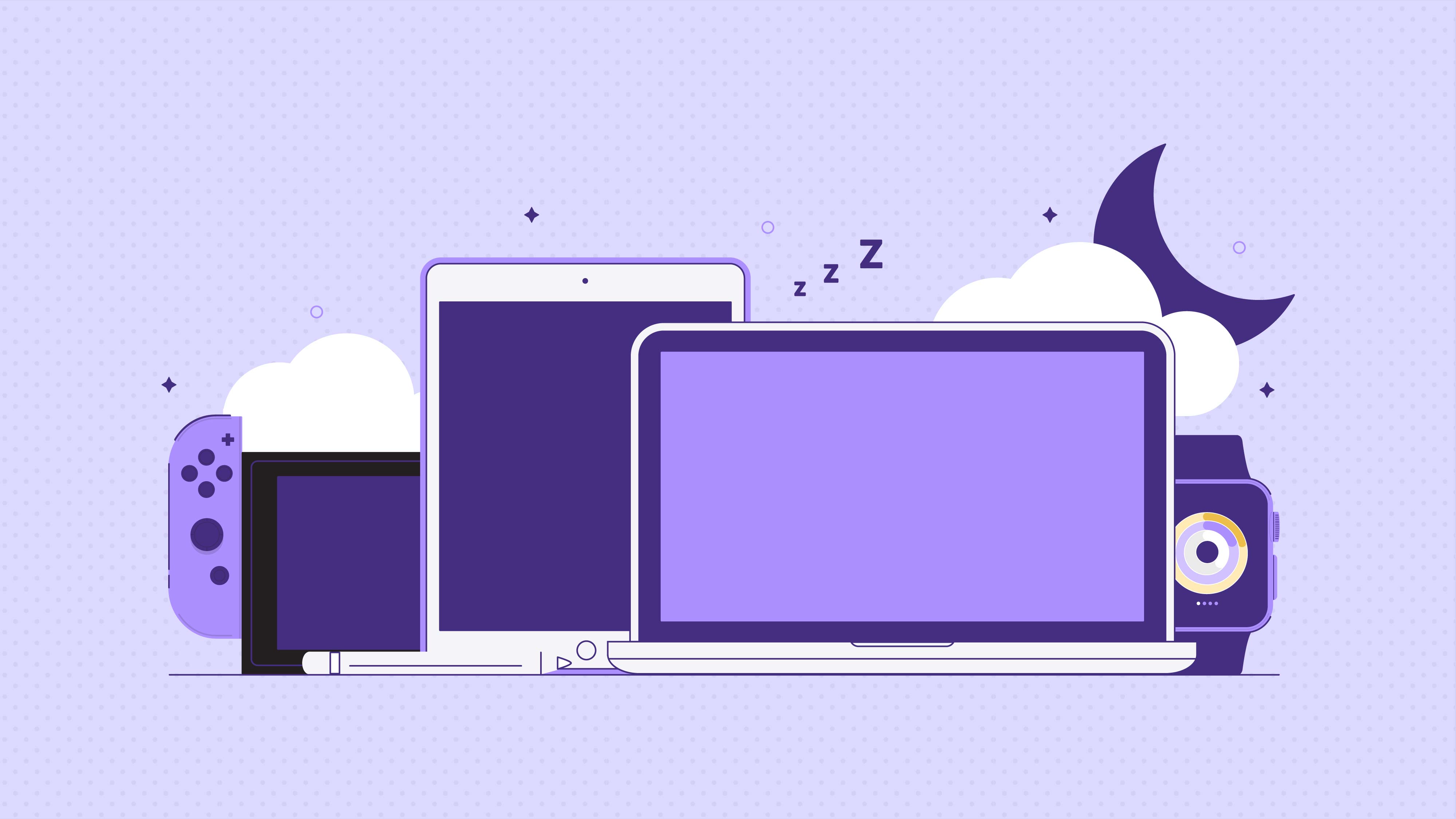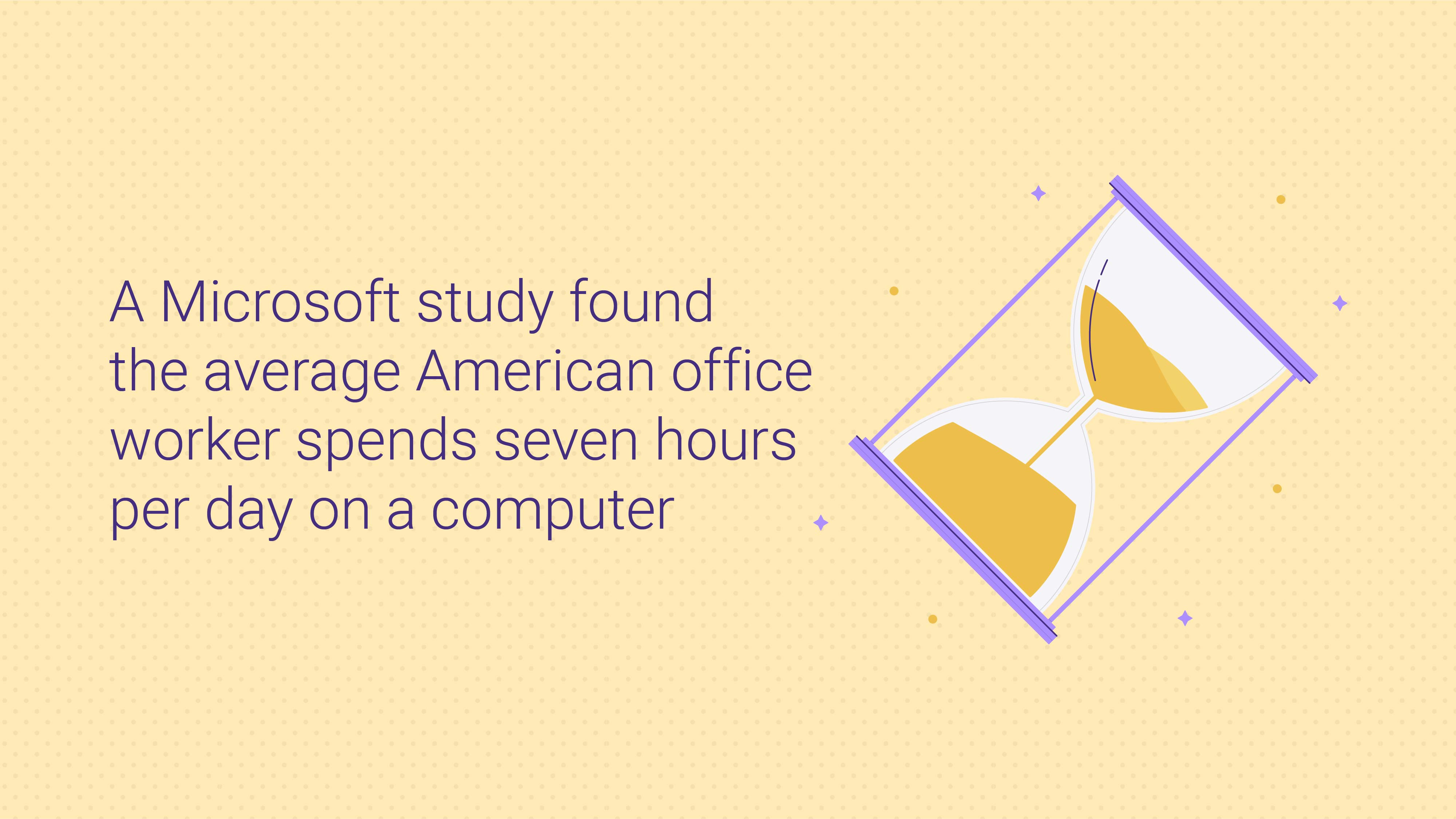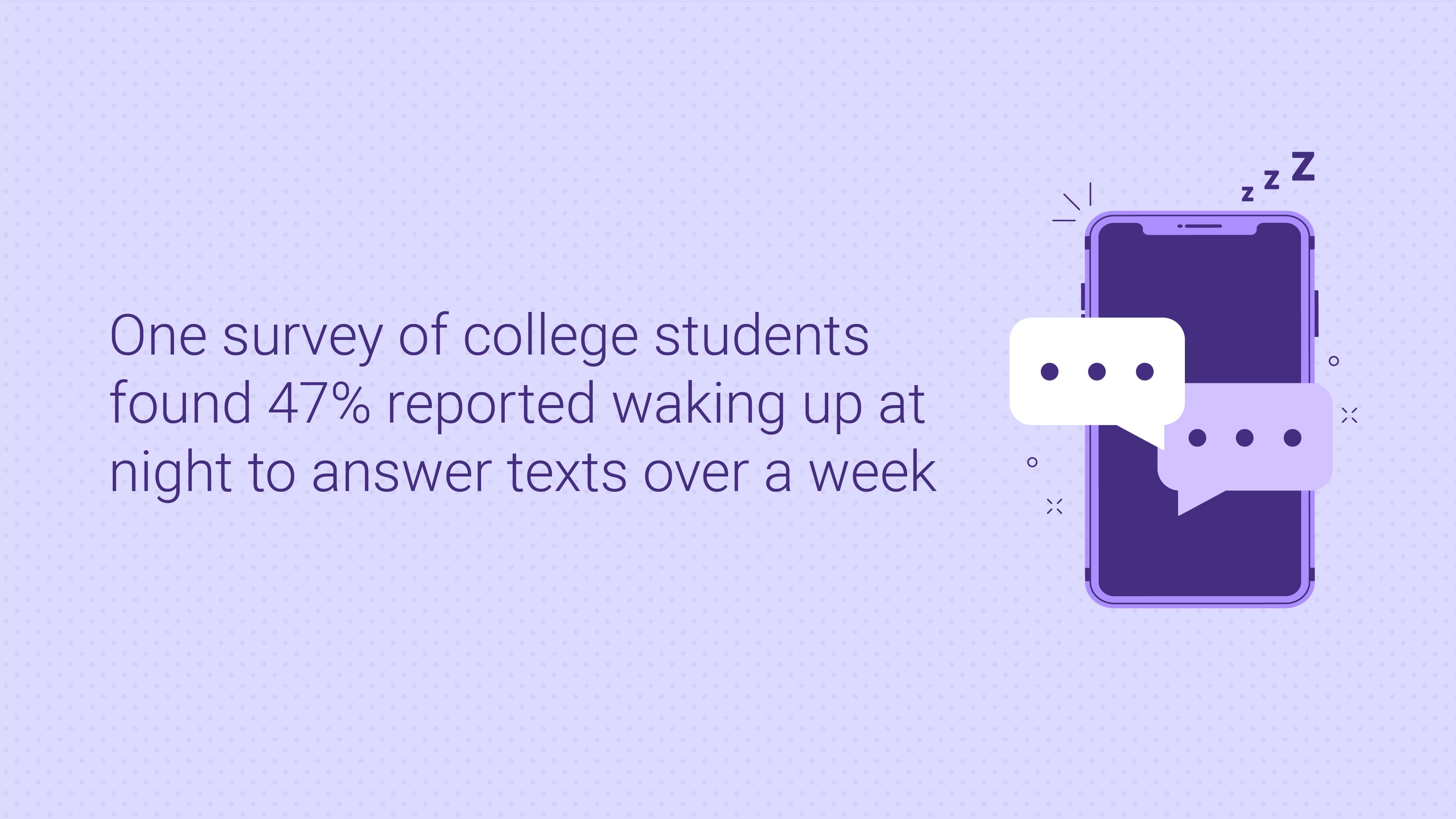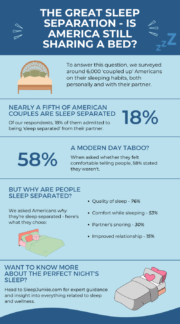
More Devices, More Problems: How Technology Affects Sleep in the Internet Age
- The pervasive use of digital devices, especially in the evening, has been linked to a range of sleep issues, including reduced sleep quality, delayed onset of sleep, and disrupted circadian rhythms.
- Excessive screen time before bedtime has been found to be especially detrimental to the sleep and overall well-being of children and teenagers, affecting physical fitness and mental health.
- Strategies for improving sleep include setting social media limits, making meal times device-free, minimizing exposure to bright light before bedtime, implementing cut-off times for all screens, and keeping smartphones and televisions out of the bedroom.
In 1920, about half of American households plugged in to on-demand electricity. Overall, this invention improved the quality of people’s lives drastically. But, it has also changed the way people live in major ways, particularly in regard to sleep habits.
For the first time, people could easily stay busy well past sundown. Darkness no longer signalled bedtime. A century later, technology use continues to explode. The average house now owns televisions, computers, cell phones and much more.
Screen time accounts for a large portion of most people’s days, between work, school and leisure activities. Modern technology use remains a key interest of researchers, who seek to understand just how these very recent changes may impact us.
From sleep to health to happiness and more, let’s look at how modern tech might be reprogramming our daily habits.
Ubiquitous Electronics and Health Impact of Being Always-On
Personal electronic devices are now ubiquitous in the modern world. Most of us can’t imagine being without a cell phone, iPad or computer for very long. When was the last time you went a full day without a single screen?
Yet, they’re actually a very new phenomenon. People have been around for centuries, but we’ve only had these gadgets for a couple decades. And, there is relatively little research into how they may actually affect people.
Almost every American is connected to screens daily. According to Pew Research Center, 96% of Americans own a mobile phone, with 81% of those now using a smartphone. At least 89% of U.S. households own a computer, and an estimated 58% have a tablet according to most recent U.S. Census data. About 96% of households now own a television (the only type of screen in decline).
Initial studies suggest digital devices may impact body weight and sleep quality. They also influence mental health and contribute to addictive behaviors. These concerns are especially high for children and teens.
The Digital Generation Z: Kids, Teens and Their Devices
It’s estimated that over 84% of teenagers have a smartphone, as do half of kids over age 11. Today’s teenagers and children have never known a life without technology. That makes tech effects quite important to understand for future generations.
Compared to 2009, teens are 16 percent more likely to say they snooze less than seven hours per night. Optimally, they should be getting more like eight to ten hours of rest each night. Researchers clearly correlate this reduction in sleep with increases in electronic device use over the same time.
Evening Screen Use Impairs Sleep and Health for Kids
For kids, screen time and tech devices are highly enticing and engaging. Games, movies, cartoons, social media and more are just a click away. At night however, these highly stimulating devices may hinder relaxation.
In the hour before bed, using digital devices significantly decreases sleep quality and duration. Children with cell phones, computers and TVs in their rooms tend to have both impaired sleep and higher obesity risk. Kids watching more than three hours of TV per day dramatically increase risk of developing later sleep problems in adulthood as well.
Alternatively, kids who read paper books before bed and have no digital devices in their bedrooms show better sleep quality. They are also more likely to have healthier body weights.
A large study of teens in London found that two-thirds of teens use some type of media device at night. This includes television, video games, computers, and phones. All evening screen-based device use was linked with worse sleep and overall quality of life measures. Use of smartphones and televisions in dark rooms was particularly associated with poor sleep.
Another teen survey found nearly two-thirds took their phones to bed with them. Over half left their phones on all night. One-third of teens admitted to texting after going to bed. About 8% said they were woken up by texts in the middle of the night more than twice per week.
Research shows consistently that overall time spent text messaging, media use after bedtime, and nighttime awakenings caused by mobile phones impair teens’ sleep.
Children with neurodevelopmental disorders may be especially susceptible to overusing electronic devices. They also may use them earlier, creating greater risk of long-term sleep disruption. Neurodevelopmental disorders include autism spectrum disorder, attention deficit hyperactivity disorder, anxiety disorders and other mood disorders. Parents in one study reported pets as being helpful in mitigating screentime for children in these groups.
Leading Causes? Fear of Missing Out and Social Obligations
Many young people are aware that technology is stealing shuteye, yet still find the urge irresistible. One study sought to answer the question of why teens spend time on phones at the detriment of rest. They found that adolescents’ fear of negative social consequences propelled this decision. In particular, teens reported being afraid of missing out as well as social consequences for unavailability and delayed responses.
Adults Aren’t Immune to Digital Dependence, Either
Adults are also spending more time on electronics too, not just teens. Research has found that adults spending more time on devices at night also are more likely to report poor sleep.
Smartphones and Internet Addiction
Often times, we don’t realize just how much time we spend on our phones. Or, just how much time overall we are now staring at screens.
One survey conducted by a marketing firm found that 79% of adults turned on their smartphones within the first 15 minutes of being awake. In fact, 62% said checking their phone was the first thing they did in the morning.
For people ages 18 to 24, this is even higher — 74% said they checked their phones right after waking. Four-fifths of adults said they were not apart from their phones for more than two hours in a day.
Another study of female college students examined effects of habitual nighttime smartphone use and internet addiction on rest. Poor sleep quality, less time asleep, using sleep medications and impaired daytime functioning all correlated with heavy internet use.
Overall, people with high use of smartphones are more likely to report impaired sleep, depression and anxiety. Findings indicate that prolonged bedtime smartphone use may be associated with altered brain functions. And, high smartphone use may also play some role in the connections between workaholism and impaired sleep.
Computers & Gaming
Of greater concern to the average adult may be the impact of unavoidable computer usage. A Microsoft study found the average American office worker spends seven hours per day on a computer, six working and one more for leisure.

Short-wave light from computer screens shows a marked disturbance to both circadian rhythms and sleep. Not only do people report greater daytime sleepiness with computer usage, but biologically, melatonin production is suppressed. Body temperature also doesn’t decline as it should.
Gaming on televisions and computers can also impact rest. Adult men and women reporting more weekday gaming time are also more likely to report poor sleep quality, insomnia and daytime fatigue. Other research found that long periods of evening gaming reduces sleep quality and also impairs cognition the next morning.
So, why are screens affecting people and how do they steal sleep?
The Top Concern for Sleep: Portable Electronic Devices
It seems that all types of screens and electronics are capable of impairing sleep. But, portable electronic devices show the strongest impact on well-being and sleep versus non-portable devices like televisions. Portable devices include smartphones, tablets, e-readers and handheld gaming devices.
Blue Light and Digital Devices
What makes these handheld devices concerning for sleep is the light that they emit. LCD and LED screens emit blue light, on all types of electronic devices. This blue light is on the shorter end of the spectrum.
Short-wave blue light is the type believed to most adversely impact rest. Light in this wavelength is stimulating and alerting, good for daytime but not nighttime. At night, bright blue light prevents the release of melatonin, the hormone that makes us sleepy.
An increase in the hormone melatonin and decrease in body temperature are key biological signals the internal clock uses to signal drowsiness. Without these, sleep is delayed. With consistent delayed bedtime, sleep disorders like insomnia become more likely. Nighttime light exposure is also linked to higher rates of obesity and diabetes.
Mobile devices tend to be used much closer to people’s eyes than screens like TVs. This has made smartphones and tablets a key area of focus in the battle to save sleep from screens.
Hue Versus Intensity: Which Matters More?
One 2015 study looked at the shortwave light emissions from an iPad, iPhone and Kindle Paperwhite. They found all devices emitted similar levels of blue light. Study authors suggest that device makers create a “bedtime mode” minimizing blue/green light. The idea is that emphasizing red/orange light with reduced backlight intensity may reduce impact.
Another study found a small improvement in sleep onset when students used an amber filter on their smartphones compared to no or blue filters.
Some device manufacturers have started responding to these concerns in recent years. For example, Apple introduced the Night Shift mode on iPads and iPhones which makes the tones on the screen warmer in hue. But this may not be sufficient.
Other research doesn’t find much difference in the hues, moreso that bright screens in general affect the biological clock. A 2019 study sought to determine if Night Shift mode on iPads actually reduce melatonin side effects compared to normal displays. They found that people’s melatonin levels were still suppressed using Night Shift mode. Researchers speculate that the luminous screens themselves actually hold greater impact than the color spectrums displayed.
One small study offers one potential solution that deserves further research. They found that when people were exposed to 6.5 hours of day time bright light exposure, nighttime tablet use did not appear to affect melatonin or sleep. For those getting sufficient natural sunlight during the day, this may mean screen time is less of a concern.
The Compounding Problem of Social Media on Mental Health
What we consume on devices also may matter in terms of how they affect sleep. Social media in particular has come under scrutiny. Not only is social media correlated with feelings of depression, social isolation, and low self esteem, it may also impair rest.
A large sample of American teenagers found that frequently checking social media in the 30 minutes prior to bedtime correlated with more disturbed sleep. Another study of teenagers in the United Kingdom looked at social media use and sleep health. They found that two-thirds of teens used more than one hour of social media per day. Girls on average spent more time on social media than boys. Higher social media use was correlated with poorer sleep measures, like later bedtimes.
While light from devices used to access social media likely plays a role in sleep disturbance, there might be more to the picture. Recent research indicates that social cognition and alertness created behaviourally by social media may be a slumber-stealing factor on its own. Thus, removing blue light may not be enough to prevent social media from affecting sleep.
So, nighttime might not be the best time to check in on social accounts. Sleep-deprivation likely won’t have you posting at your peak game either. Spelling errors, poor judgement, a worse sense of humor and control over emotions all suffer when tired. Researchers can even reliably predict whether or not tweets come from a sleep-deprived brain!
Bedtime Stories are Great, but Reading them on Technological Devices May Not Lead to Sweeter Dreams
Reading has long been a way for people to wind down and prepare for bed. It’s proven to help reduce stress, improve creativity, improve cognition, and may help relaxation and sleep. But, reading on a screen might be a different story.
Many people now use phones and tablets to read rather than paper books. But, research has found that reading on digital devices before bed actually yields adverse effects on sleep. Compared to reading a paper book, people reading e-books showed reduced melatonin, later circadian timing, and took longer to fall asleep.
An interesting study compared reading a book on an e-reader versus paper. They found that cerebral blood flow increased in people reading the novel on a digital device, but not a paper book. The part of the brain responsible for expressive speech also showed higher activity with the e-reader. Authors suggest that lighted displays are not the only thing affecting people’s sleep when reading on electronic devices at night.
Some researchers suggest that these effects may be due to people feeling less tiredness and delayed sleep pressure in general with electronic devices.
Not All Bad: Digital Devices Offer Sleep-Supporting Solutions, Too
As with most innovations, technological devices can be both harmful and helpful. We’ve seen that too much screen time before bed doesn’t appear to help wellness. On the other hand, there are a few ways technology like smartphones might also improve sleep.
Smartphones can help track and report people’s sleep patterns over time at home. Apps can also deliver therapeutic training on good habits, such as relaxation techniques and web-based cognitive therapy for insomnia. Newer smartphone-based sound monitoring tools may also be helpful for assessing sleep apnea and night-waking problems.
There are many apps that aim to track sleep duration, cycles and quality. Many of these apps use the devices’ motion and sound-detection tools to track sleep and disturbances. One small study from 2019 looked at four popular sleep apps. They found that all measured time-in-bed accurately. But, only one accurately measured hours of sleep. None appeared to measure deep sleep, REM sleep or wake detection effectively.
The majority of consumer apps lack peer-reviewed testing, but they can help people get a better idea of their sleep habits and wellness. They can also provide additional insights for people’s at-home sleep diary records that could be useful to physicians.
Many manufacturers also are working to create ways to minimize light impact. Some offer the ability to institute bedtimes that disable phone functions. Do-not-disturb modes can also be a valuable way to avoid being interrupted at night. (These typically include functions that allow for critical contacts to still get through in the case of an emergency.)
Another way smartphones may actually be useful are gentle-wakening apps that use mild nature sounds instead of harsh alarms. However, reaching for a smartphone first thing in the morning is another debate entirely. As is keeping a digital device in the bedroom at all, especially for teens tempted to check social media all night.
11 Ways to Minimize the Impact of Technology on Your Sleep
In the modern world, technology is unavoidable. We must use computers to work and study. Social media is often inevitable, and digital devices provide sources of enjoyable entertainment. Smartphones are how we keep in touch with people, and they provide many useful benefits to our lives.
According to the National Sleep Foundation, nine in ten people use a digital device in the hour before bed. So, if this is your routine, you’re certainly not alone! If you sleep like a baby and have no problem unplugging, you’re likely managing screen time just fine.
If you find yourself browsing Instagram yearning for a good night’s sleep more often than you’d like though, we have some suggestions below. Overall, the key to balance is actively managing screen time to minimize its potentially negative effects.
Set Social Media Limits
Generally, more time spent on social media is less time being productive. High social media use is also correlated with negative effects on emotional health and happiness.
Consider reducing overall time spent on social sites, especially in the evening. Research suggests it is particularly important to avoid social media in the 30 minutes prior to bedtime.
Make Meal Times Device-Free Times
Using digital devices and watching TV during meal times is associated with more overall screen time and with greater risk of obesity. People also tend to eat more when distracted by television and video games.
During family meal times, set phones down and turn TVs off. Not only does this encourage communication, it helps minimize technology use and instill healthy eating habits.
Be Mindful of Evening Content
The type of media viewed at night can have an influence on sleep. Content that is more alerting, like scary or violent shows and games, can make it harder to relax. Even news programs can trigger anxiety, particularly for kids.
Other interesting findings include that frequent nighttime podcast listeners may be more likely to have nightmares, while TV watchers are more likely to sleepwalk. Violent videos also may make violent dreams more likely.
As it gets closer to bedtime, aim for pleasant, humorous or relaxing media.
Start Dimming Lights as Bedtime Approaches
During the day, bright, blue-toned lights keep us awake and alert. As the sun goes down, start transitioning to dimmer lights and use lamps instead of bright overhead lighting. Choose bulbs on the warmer end of the spectrum for bedrooms and living spaces. Lamps or fixtures with dimmer switches are ideal, as bright room lighting can suppress melatonin.
Dim the displays on your electronic devices and screens in the evenings as well. Switch to night/dark mode if your device allows.
In the hour before bed, the less light the better. At night, rooms should be as dark as possible. If you have bright or blinking LEDs on things in your bedroom, turn them off or cover the LEDs with a small piece of tape. Blackout curtains can also be a good idea for bright areas or people who’s schedule runs later.
Set a Cut-Off Time for all Screens
The vast majority of research finds that all types of screens are associated with impairments to bedtime and less sleep. These include televisions, computers, mobile phones, video games, and other handheld digital devices. Avoiding screens at least in the hour before bedtime can help minimize their influence on rest.
For teens, overall mobile phone use and number of screens in the bedroom seem to impact sleep the most. For pre-teens, overall internet-use and turn off times seem most important. Experts suggest less than 2 hours per day of total screen time for teens. So, not only is it important to minimize use before bed, but also total amount of time on screens during the day.
Handheld devices seem to affect sleep the most, so setting a bedtime for electronic devices can be a smart move for both kids and adults. On most smartphones, you can track daily screen time and set limits. Modern televisions and computers usually have similar functions. You can also set bedtime reminders that tell you (or your child) it’s time to power down for the evening.
Make sure your bedtime allows for enough sleep, too! An adult needs between seven and nine hours each night. You also want to make sure you have enough time to fall asleep comfortably.
- If you feel best with a solid eight and wake up at 7AM, try to put electronics down by 9:30PM and be in bed around 10:30PM.
- Kids need more sleep, so their bedtimes and screen off times should be earlier. For example, an 11 year old waking at 7AM should be off screens by 7:30PM and in bed about 8:30PM.
Read Paper Books and Media Instead of Digital Books
Reading before bed is great, but as the research shows, reading from screens may not be. Choose paper bedtime stories for kids and yourself, and save the e-reader for daytime reading. Books, magazines or even doing some journaling in a moderately-lit room can be a perfect part of your bedtime routine.
If you don’t enjoy reading, consider journaling about your day or keeping a gratitude journal to wind down without screens.
Keep Televisions Out of the Bedroom
Multiple studies find that children with a television in their bedrooms are more likely to experience sleep problems. They also predictably watch more overall television. Sleep experts recommend that adults keep TVs out of their bedrooms as well.
Using your bed for anything other than sleep can affect your brain’s association with it as a place for rest. And just like social media, more television viewing is associated with higher feelings of isolation and depression. Having a TV in the bedroom might influence intimacy and perceptions of satisfaction for couples as well.
Keep Smartphones Out of the Bedroom
Boundaries on technology are important for both kids and adults. When your phone is right beside you, it’s easy to grab it and check emails, Facebook, or read the news if you’re bored. You’re also more likely to wake up if notifications sound or lights flash.
Teens whose phones wake them up at night are more likely to develop sleep problems. One survey of college students found 47% reported waking up at night to answer texts over a week. Answering calls woke 40% of students. Those who woke up to use their phones reported poorer sleep quality and were more likely to report symptoms of anxiety and depression.

Setting the phone on silent, turning ringers off, and putting it face-down can help. But, the best way to remove the temptation and distraction is by parking phones outside bedrooms at night.
Utilize Do Not Disturb Mode at Night
Many smartphones have a Do Not Disturb mode that can be turned on at night. This will send calls to voicemail and keep notifications on silent until switched off. Some phones allow it to be scheduled daily as well, as part of a Bedtime or Sleep mode.
Usually, you can set a list of contacts whose notifications can still come through. Or, if someone calls multiple times in a row their call can get through. This can let you rest with the peace of mind that if there is an emergency loved ones can still reach you if needed. And the things that don’t need immediate attention can wait until morning.
Use Standard Alarm Clocks
Smartphones replace alarm clocks for many people with their handy, portable and easy to use functions. But, keeping your device on the nightstand leaves the distraction dilemma. And, it also makes it more likely you’ll spend time first thing in the morning on said phone.
If you or your teen finds this habit hard to break, consider going back to a standard alarm clock.
Avoid Using Screen Time as Rewards
Since digital entertainment proves enticing to kids, it can seem logical to use it as a reward for chores or good behavior. But, since screen time should be used in moderation, that might not be the best way to disincentivize its use.
One study found that using digital devices and screen time to reward/punish behavior resulted in children spending more overall time in front of screens. Likened to sugary treats, using screens to modulate behavior may make their use more attractive to children. Children also spend more time in front of screens when their parents do the same.
What does your evening tech routine look like, or what steps do you take to prevent technology from stealing your slumber?



Comments (4) Leave a reply
Really great information when it comes to sleeping habits and the many different things we can do to “unplug” from all these devices.
I haven’t had a TV in my bedroom for several years now. But, I do need to hear my TV sounds many nights in order to get into the right frame of mind, so some nights I leave it on very low OR many night’s I will set “Sleep Mode”.
I hope to do better.
I wonder if it could help with snoring?
My name is Crystal and I’ve always had a hard time sleeping work trust kids but I love this sleep and I never get enough sleep I’m always going back and trying to get sleep so I’m hoping I can find something that is comfortable enough to give me a deep enough sleep we’re not going to be tired throughout the day
I read your ad for sleeping beauty, I am a person who has many problems sleeping, I have already tried many mattresses and sometimes I go at 7 in the morning and I still do not sleep I wake up with back pain, waist pain, etc., etc. I don’t know if it could be the right person to test your mattresses and tell them if they really work and you can sleep comfortably thanks